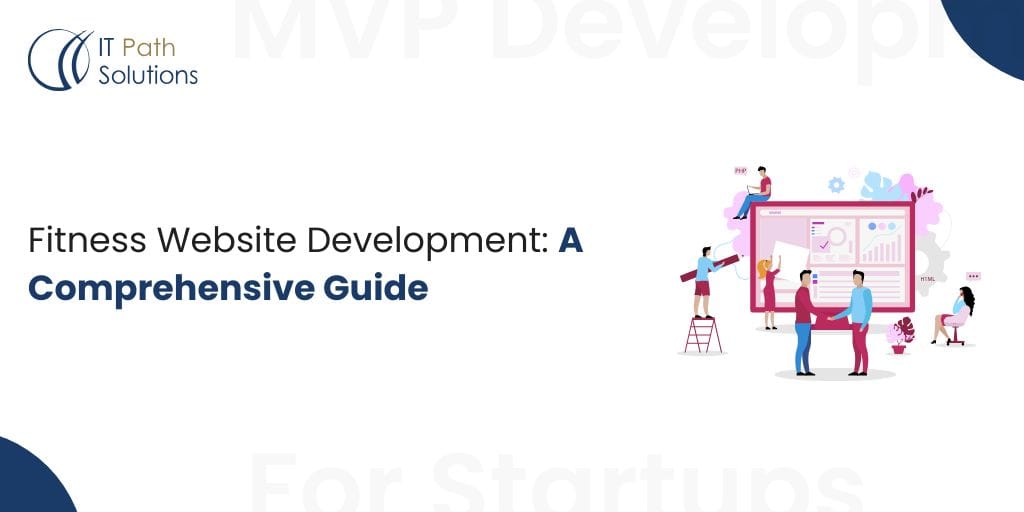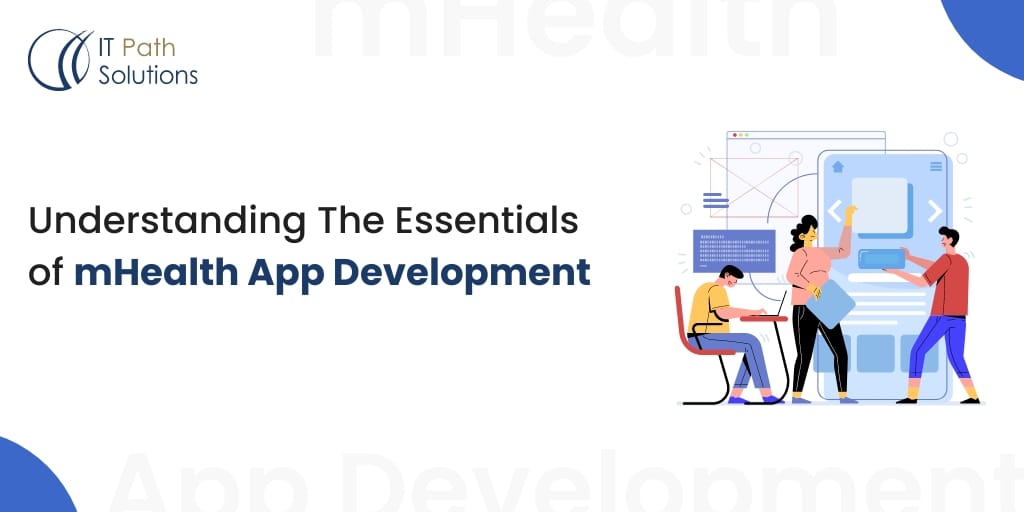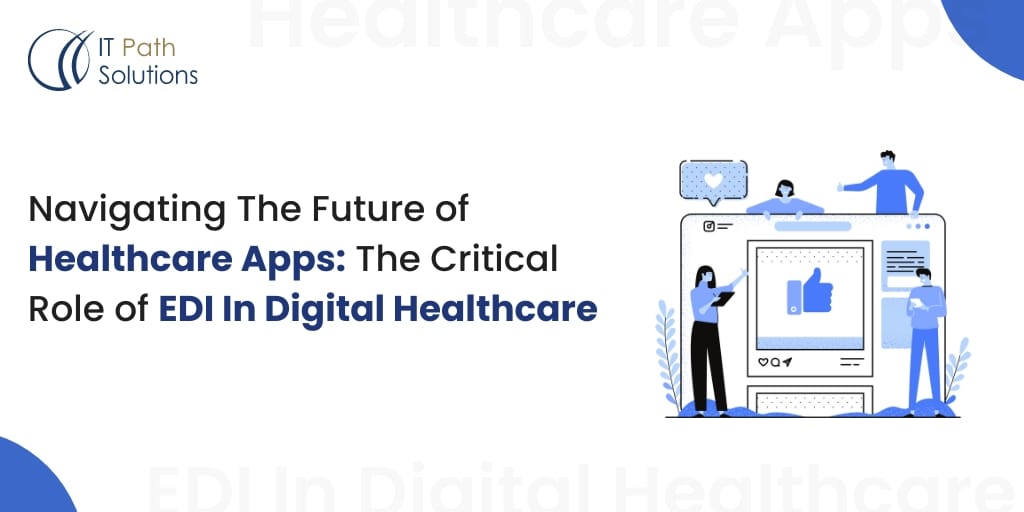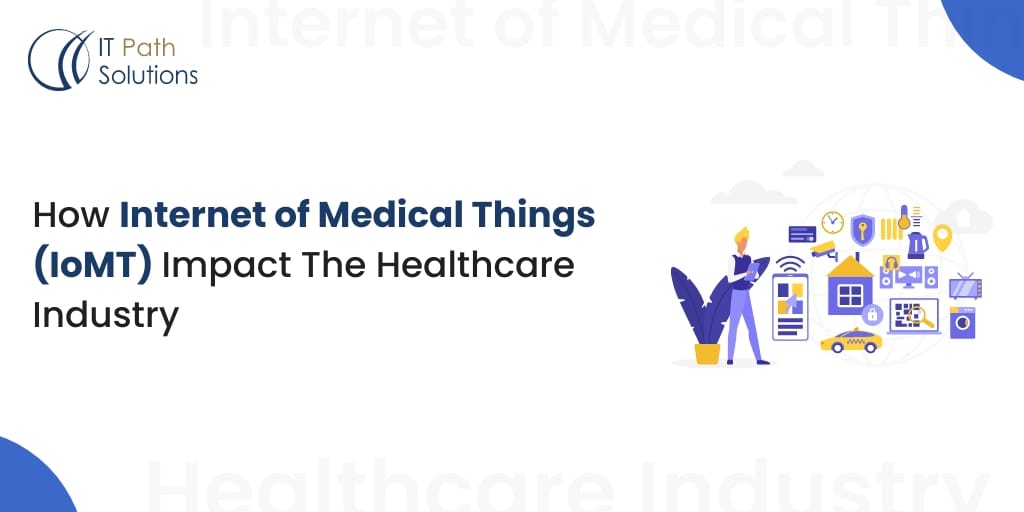Mental Health App Development: Types, Features, Benefits
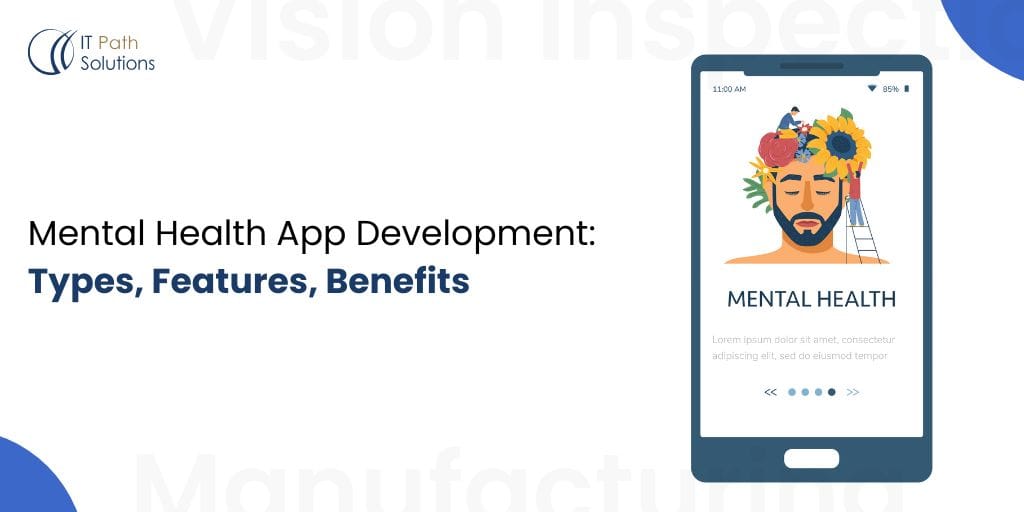
Mental health effectively relies on conversations! But with people considering the illness discussion as a stigma, they usually do not open up to talk about it, seek help, or get therapy. If we look at the United States statistics, approximately 59 million people have mental health problems with different degrees of severity. If these people are left untreated, it may result in severe symptoms and unexpected outcomes. This is why, the awareness about mental health apps is increasing as it has the potential to bridge the gap in mental healthcare.
In this article, we will discuss mental health apps and how they are a savior in the mental health industry.
Mental Health Apps: Why You Should Build One?
With a busy lifestyle and the work pressure under which the current generation is living, issues like depression, anxiety, and stress have become alarmingly common.
Individuals struggling with mental health illness are reluctant to seek help due to time constraints, limited availability of therapists, and ease of access to traditional clinic visits. But what if a technology-led solution that is easily accessible comes into the picture? Mental health app development will bring a significant change in how mental health services are accessed.
With the introduction of mobile mental health apps, people’s accessibility will increase, they will feel less shy, and the stigma over mental health treatment will be reduced. When implemented effectively, these solutions have the potential to foster a healthier, more understanding, and stress-free society.
If you have any mental health app development ideas that can help society, we would love to speak with you! Get in touch!
Why You Should Build a Mental Health App?
Earlier, mental health therapy was costly and affordable to only 1 out of 4 people. The pandemic, isolation, and quarantine raised concerns about quick treatment and effective therapy consultation. However, mental health apps can become a lifesaver in many such difficult situations–Ease of accessibility and affordability being the highlights of app development.
Mental apps can serve as a personal toolkit that effectively checks for users’ well-being. They monitor everything, including their mood, sleep pattern, and stress, and suggest the next steps of action. They are super convenient and affordable to people even with low incomes.
Let’s look at the figures that suggest the rising demands.
- The mental health market was valued at $4.2 bil. in 2021 and is projected to grow to $17.5 billion. by 2027
- First-time downloads of the top 20 mental wellbeing apps in the US grew by 30% from January to April
- In the Fiscal Year 2024 Budget, $10.8 billion has been allocated to SAMHSA
- 2024: The market size is projected to be $7.09 billion to $7.19 billion.
- The mental health market size is growing tremendously and is expected to reach $26.36B by the end of 2032
Benefits of a Good Mental Health Application:

Here are a few benefits that users can explore using a good mental health app.
- Convenience: Mobile mental health applications are super convenient to use. Users can simply download the application and access the service.
- Accessibility: People who fear visiting mental health care setups, hesitant to seek help, or considering mental illness a stigma can now access these apps privately. This will provide them with therapy and also bring improvements in their mental health.
- Self–exploration: Mobile apps would help users monitor their sleep, mood, sleep habits, etc. These insights will give users time to look deeper into themselves and work on well-being.
- 24*7 Support: Mental health applications are accessible round-the-clock, which is why they offer assistance during any emergencies.
Read more: Detailed Guide to Developing a Fitness App in 2025
Types of Mental Health In the Market:
Here are the various mental health app development ideas that you can explore for development.

Mental disorder control apps:
Mental disorder control apps are apps that assist individuals suffering from mental disorders like OCD or bipolar disorder and anxiety. These apps facilitate early detection of the symptoms and provide validated therapy methods. It focuses on cognitive behavior therapy (CBT), acceptance and commitment therapy (ACT), and positive psychology techniques to help people improve their mental well-being.
It also helps in anger management and prevents it from getting worse. Many mental health management apps include specialized ACT and PTSD coaching, offering personalized guidance for those struggling with these challenges.
Anxiety, Depression, and Mood Control Apps:
As mentioned above, globally people are struggling to combat mental health diseases like anxiety, stress, and depression. Stress management apps provide a range of features using which patients can treat their illness effectively.
To overcome the illness, they can access features such as video consultation with therapists, self-assessment modules, emergency consultation, and various diagnostic tests. Such apps can be a panacea for critical scenarios.
Addiction recovery apps:
Overcoming any kind of addiction is difficult to deal with. Be it alcohol, cigarettes, or anything that is excessively done and affects mental health. Addiction recovery apps are designed to break these habits and reclaim control over their lives.
Such apps provide motivational speeches or goal-oriented activities that help people stay away from the addiction.
An important feature of such kind of application is live support that provides real-time assistance and encouragement. This functionality can significantly enhance the effectiveness of addiction therapy, making the recovery process more manageable and impactful.
Meditation Apps:
Meditation and mindfulness are gaining worldwide awareness and are recognized as essential practices for achieving mental peace. People are turning to mindful meditation therapies to have mind peace and wellness. These apps encourage people to spend some dedicated time in silence and practice meditation.
The best features that these kinds of applications offer are sound music, motivational stories, breathing exercises, and relaxation techniques. Such activities promote a healthier and mindful lifestyle.
Which Are Some of The Best Mental Health Apps in The Market?
There are more than 10,000-15,000 mental health applications in the market. But out of these, a few of them are doing exceptionally well which we will discuss in this article. These applications can be used as a reference while developing your mental health app.
BetterHelp:
BetterHelp is an online mental health care app founded in 2013. It facilitates therapy counseling through various mediums like video calls, live chats, or audio calls. The application’s mission is to simply provide therapy services 24*7 while the user is sitting at their convenience.
The therapists are extensively vetted and confirmed to have a minimum of three years of experience in the field. They are capable of providing treatments for stress, anxiety, trauma, etc.
Platform availability: iOS and Android
Pricing model: $60-$90 per week and charged every four weeks.
Calm:
If you run a Google search for a mental health app, the Calm app tops the search results. It is the most popular app helping people struggling with insomnia and poor-quality sleep with effective therapies. The application provides free as well as premium subscription accessibility where the free version provides timed meditation sessions, sleep scenes, bedtime stories, and breathing exercises.
On the other hand, the premium version covers other advanced resources like better sleep, bedtime stories from renowned celebrities, etc. The application is well-known for taking the user to a different level of experience with its yoga coaching, stretching, etc.
Platform availability: iOS and Android;
Price: It provides individual as well as family plans starting from $14.99/month and $99.99/year respectively.
Headspace:
Headspace has been in the market since 2010. Headspace was developed by British entrepreneurs Andy Puddicombe and Richard Pierson. Mr. Puddicombe was a former Buddhist monk, associated with a meditation clinic in London. He, together with Richard Pierson brainstormed a brilliant idea of developing a mental health app.
The application guides on anxiety, fear, stress management, etc. The “sleepcasts” feature provides soothing stories that people can’t stop praising. Do you want to develop an app like HeadSpace too? Call us!
Platform availability: iOS and Android;
Price: The application is free to download and a premium subscription is available at $12.99/month or $69.99/year.
MindDoc:
A great self-monitoring application on the list is MindDoc. It is developed by clinical psychologists and mental health researchers to help people with emotional well-being.
Users can register and sign in to the application and set their calendars to view different patterns and progress of wellness. The application provides personalized recommendations and psychological exercises to boost the user’s mood.
Platform availability: iOS and Android
Pricing: The subscription fees start from $29.99 for three months.
Must-have Features of Mental Health Apps:
Modern mental health application requires an advanced approach and competitive research that helps in understanding the offerings of your mental health application. According to our research, the primary focus while designing the features of mental health apps should be how the application can provide cognitive behavioral therapies, Stress relieving therapies, gamification, consultation, etc.

Here are a few basic features that you can implement in your application.
User-Side Features:
| Easy signup | Let users access the platform using social media accounts or authorized Email accounts. |
| Profile setup | Allow users to enter their personal details like their age, sleeping habits, eating habits, weight, etc. |
| Push notification | Notify users about any of their milestone achievements or target achievement tasks etc. |
| Data protection | Ensure that the application is HIPAA compliance |
| Chat | Allow users to consult therapists through chat or audio calls |
| Video calls | The app should facilitate video consultation with doctors and therapists |
| Dashboard | Let users view their progress and manage their goals accordingly |
| Schedule | Allow users to schedule an appointment or call with therapists based on the calendar |
| Therapist profile | Users should be able to check their therapist’s profile with photo, age, and expertise and select accordingly |
What Is The App Development Process for Mental Health App Development?
Mental health app development needs a very unique approach to app development. The comprehensive approach should focus more on personalization, security, and ease of accessibility.
At ITPath Solutions, we follow a strategic approach to app development. Here is the blog where you can read more about how we craft a successful app solution.
Here is an overview of how we operate.
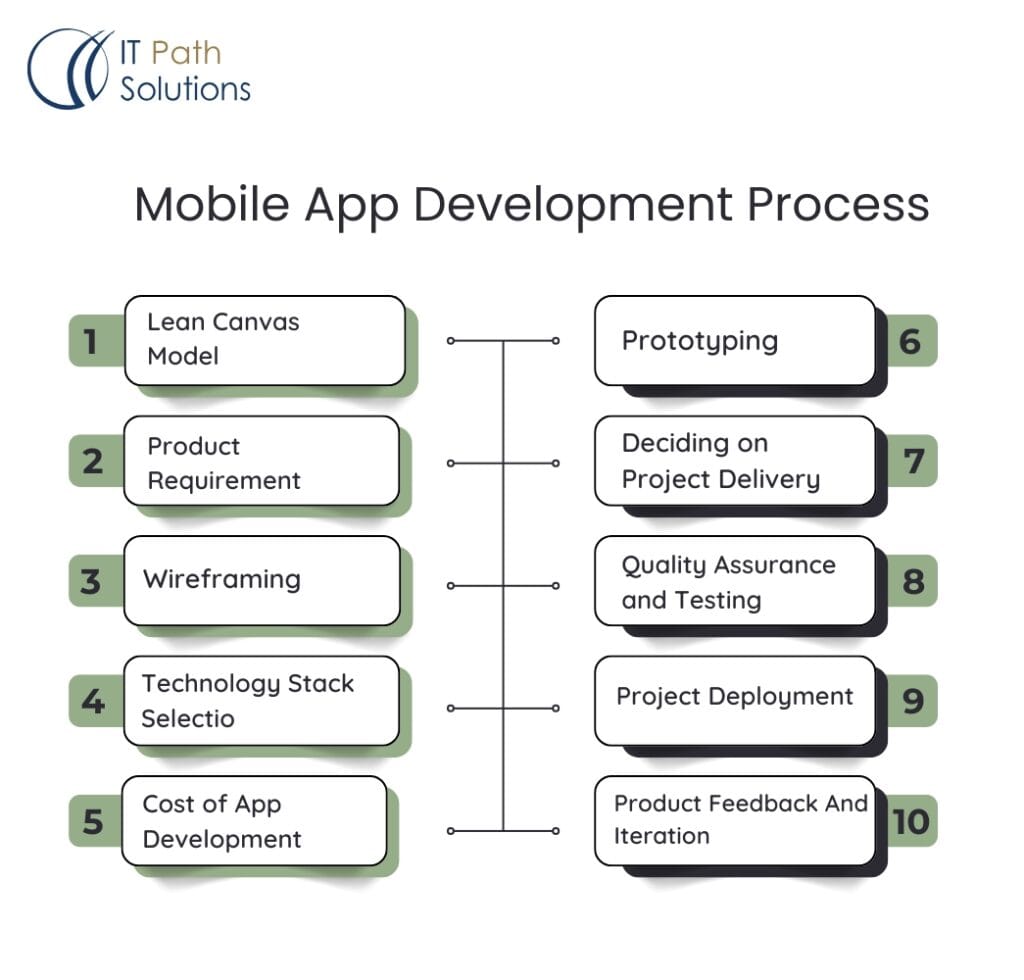
What Is The Cost of Developing a Mental Health Application?
The cost of mental health app development is very subjective and depends on a variety of factors. Factors such as advanced features, API integration, security compliance, etc affect the application development cost.
At IT Path Solutions, the cost of mental health development ranges between $30,000 to $60,000 subject to customization. Get in touch with us to discuss more about the cost and features of your app idea.
Concerns and Challenges Associated with Mental Health Apps:
Over platforms like mental health apps, people are going to share their health details, which is why security of the private data is a very big deal. Here are a few things that you need to consider while developing a mental health app.
- The application should comply with the HIPAA in the US.
- The application should be GDPR compliant in the EU.
- Similarly, it should comply with PIPEDA in Canada.
- The application should be designed in a way to builds trust and helps people in their wellness journey.
Concluding Thoughts:
The mental health app market is very demanding as well as concentrated. However, there is always room for an application that performs exceptionally well while serving the purpose.
We hope this article has helped you gain a deep understanding of important aspects like market trends, benefits, and features related to mental health apps. However, if you still have any questions, feel free to reach out to us with your queries.
FAQs:
How long does it take to develop a mental health app?
At ITPath Solutions, mental health app development usually takes around 6-9 months to complete.
What are the different types of mental health apps?
The 3 popular categories of mental health apps are:
Therapy apps, meditation apps, and mood tracker apps.
How do you make money using a mental health app?
There are various profitable ways to make money using mental health apps. A few preferred ways are:
- Freemium model;
- Subscription model;
- In-app Purchases;
- In-app Advertising;
- Affiliate marketing;
- Data monetization;
 Healthcare
Healthcare  Education
Education  Real Estate
Real Estate  Logistic
Logistic  Themes
Themes
 Plugins
Plugins
 Patterns
Patterns
